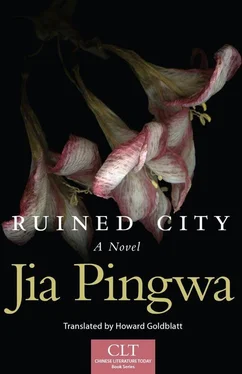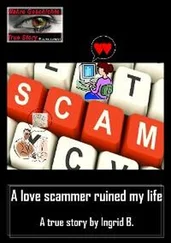The walled area there was Xijing’s famous “ghost market,” where the city’s junk was bought and sold every day after dark and before sunup. Funny thing was, it was called the ghost market because of its hours of operation, but the area did have an eeriness to it. It was low to begin with, and the section of the moat outside the gate was the deepest and widest, with the most vegetation, shrouded in fog in the morning and at dusk. The streetlights were dim, and the people at the market usually talked in low voices. Dressed in tattered clothes, with disheveled hair, they rushed about, casting shadows on the moss-covered city wall by the streetlights that were sometimes oversized and sometimes diminutive, a sight both gloomy and scary. Early on, the market had been the gathering spot for junk collectors to sell their wares to people who needed parts — a pedal wheel or chain for a bicycle, a burner tile or a hook for a gas stove, masonry nails, broken windows in need of repair, a section of water pipe, faucets, chairs, used planks to replace the leg of a bed, plywood, house-painting rollers, caps for hot water bottles, springs for home-made sofas, burlap sacks, and the like. People went there for daily necessities they could not find at state-run or privately owned stores, or because they could get things cheaper there. But as the size of the market grew, those frequenting the area were no longer limited to the ragged country folks who came into the city to collect junk, or the teachers and government employees who dressed in four-pocket shirts and wore their hair parted down the middle, combed back or crew-cut. Gradually mixed in were men in baggy shirts with baggy pants, tight shirts with tight pants, baggy shirts with tight pants, and tight shirts with baggy pants. They brightened up the place, peppering their speech with an argot that no one could understand. Women with blood-red lips and blue eyes or girls with full breasts and prominent hips ran their stalls. These fashionable types changed their looks constantly, wearing three-inch, chopstick-thin stilettos one day and slippers revealing chubby white toes with scarlet nails the next. As for the men, they might sport light brown hair down to their shoulders in the morning and show up in the afternoon with their heads shaved. They were often heard bragging about the name-brand items they wore. Believing that the addition of the new group raised their status and value in the city, the original buyers and sellers in the market basked in the prestige at first, but soon they realized that the newcomers were nothing but hooligans, rascals, thieves, and pickpockets, people who sold brand-new bicycles, wheelbarrows, and three-wheelers cheaply, or dealt in items the old-timers had never seen before, such as rebar, cement, aluminum ingots, copper rods, all sorts of pliers, wrenches, electric cables, wire, even broken manhole covers with the words “urban construction” still visible. Soon more junk shops opened up in the narrow Wangjia Lane, not far from the ghost market, including the one run by Hong Jiang’s relative. Business was good from the get-go; the proprietors reaped impressive profits by reselling the junk to state-run junk stations or directly to factories and township industries in outlying counties. Niu Yueqing and Zhuang Zhidie, and even the three female bookstore clerks, were unaware of Hong Jiang’s secret venture.
A large sum of money was needed to expand the bookstore and add a gallery, far more than the forty thousand yuan from Niu Yueqing. The revenue from earlier book sales helped, but not enough. Hong Jiang’s idea was to form a board of directors for the gallery, offering each member space at the door to display ads for their business, with the added incentive of an annual gift of two paintings by famous artists. When member businesses organized an activity, the gallery would invite renowned painters and calligraphers to liven things up with demonstrations. In fact, what Hong Jiang had in mind was simply business sponsorship, or, to put it bluntly, asking the businessmen for donations. After a discussion with Zhao Jingwu, Hong Jiang went to see Mr. Huang, the owner of the 101 Pesticide Plant.
Since this was their first meeting, Hong introduced himself and praised the efficacy and quality of 101 Pesticide. He went on to say that he could sense that Huang was a prototypical modern entrepreneur the moment he met him. Huang’s nose was dripping; he had a cold. “Is this for corporate sponsorship?” he asked. “How much?”
“Do you get a lot of that?”
“Like locusts,” Huang said. “I have no idea how they know I have money, but they’ll say anything to get some of it out of me.”
“That’s because, one, your products have a great reputation,” Hong said with a laugh, “and two, the article by Zhuang Zhidie has had a tremendous effect. But you must be on guard so as not to be swindled. I’m here to see you because, one, I’d heard of you but had never met you, and I’m always on the lookout for new friends; and two, on behalf of Zhuang Zhidie, I want to use our newly opened gallery to promote your plant.” He produced a copy of the rules regarding the nature and responsibilities of the board and the qualifications of a board member. Huang took it with a smile and, like a schoolchild reciting a text, read the rules word for word: “Minimum membership fee is five thousand, parenthesis, at least five thousand, parenthesis. Ten thousand will make the member eligible for vice chairman of the board. There is no limit to the number of vice chairmen. The chairman of the board will be Zhuang Zhidie, the celebrated writer.”
When he finished, Huang looked up open-mouthed. His son, who was doing homework in the yard, came in with a book.
“Dad, what’s this character?”
“Don’t you know that one? It’s ocean, as in ocean liner,” Huang said after looking at the book. “Let’s say it three times together so you’ll remember.”
“All right.”
“Ocean, ocean, as in ocean liner,” Huang said, followed by his son’s “Liner, liner, as in ocean liner.”
“No, it’s ocean as in ocean liner, not liner,” Hong chimed in.
“Go on, get out of here. You don’t pay attention in class and then come home to confuse me.” After shooing his son away, Huang turned to Hong, “That’s all there is to it?”
“It’s a privilege to share a bench with cultural celebrities. Do you plan to be a plant owner forever? Why not become a real entrepreneur?”
Huang chuckled. “Let’s go inside.” After inviting Hong into the house, he offered his visitor cigarettes and tea. He asked if Zhuang Zhidie had moved recently, if his father-in-law had recovered from his illness, and if, as planned, he had lasered off the mole on his chin.
“No need to test me, Mr. Huang,” Hong laughed. “But that was quite clever of you. If I were a scam artist, I’d say what I thought you wanted to hear and be exposed, like the wolf pretending to be Little Red Riding Hood’s grandmother. Check this out. Doesn’t this seal look exactly like the one on the scroll hanging on your wall?” Hong handed him the bloodstone seal and let him press it on a piece of paper. They were identical.
“Zhuang Zhidie left this seal at the bookstore, originally for a book signing, but he had to attend the People’s Congress and then he injured his foot. So we stamp it on the title page of his books, which are selling faster than ever. He’d have come in person today if not for his bad foot, which is why I came with this seal. It represents Zhuang himself; you can trust me on that.”
“Of course I trust you. And I don’t need to examine the seal carefully; would I trust a seal if I didn’t trust you? Don’t police often break cases of people making fake government seals?” Then he asked, “How did Mr. Zhuang injure his foot? Is it serious?”
Читать дальше


![Matthew Vincent - [you] Ruined It for Everyone!](/books/216429/matthew-vincent-you-ruined-it-for-everyone-thumb.webp)









